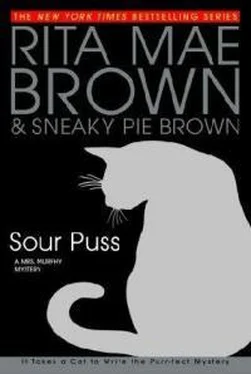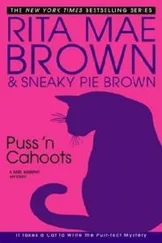Professor Forland quickly interjected, "Our labs currently investigating such possibilities enjoy security. The problem is if some doctor or technician goes off on their own, a Unabomber of agriculture. That person could cause considerable distress, because we don't think of one of our own behaving in such a fashion."
"He's right. Our attention, thanks to the media, is focused on Muslim terrorists, on bombs, radiation, anthrax. Those are immediately understandable and, I guess, exciting in a way. Agriculture is only exciting if you're a farmer. Let's face it, city dwellers wouldn't know a boll weevil if they saw it and most of them couldn't tell the difference between tent caterpillars and a yellowswallowtail-butterfly caterpillar. We aren't on their radar screen, but they all demand cheap food," Pittman sarcastically said.
"Which makes it more dangerous, because they aren't prepared," Aunt Tally piped up, her voice still strong and clear.
"Well—yes," Professor Jenkins agreed. "Many of you remember when Dutch Elm disease swept the East Coast. People in big cities saw the trees die but it didn't register, in any way at all, that this would compromise oxygen. Think of it, that many trees dying in that short a time span means there is less photosynthesis. Less oxygen is being produced. Therefore pollution in the big cities becomes more pronounced. These basics do not occur to people who work in buildings where the windows don't open." He said this with a half smile, but it was obvious the ignorance distressed him. "Nor did they replenish their trees. While industry and cars cause pollution, removing trees exacerbates the problem."
"Do either of you think we are more in Danger from an American crackpot than a true terrorist?" Tracy Raz, an ex-Army ex-CIA man, asked.
"Who knows?" Professor Jenkins threw up his hands.
"I'll take that on." Professor Forland became animated. "We are in far more danger from foreign terrorists than homegrown. Number one, they are highly trained, motivated by political and religious concerns, and well funded. An American may be highly trained, they may have some hideous motivation that makes perfect sense to them. To date we've suffered a few isolated crackpots. It's not inconceivable that sometime in the future an extreme religious or political organization could fund such activity. Right now that appears unlikely. But I think it's much harder to guard against a well-organized group with an expressed purpose."
The discussion rolled on. Jim Sanburne could add up the time spent in meetings, conferences, and lectures in years. He'd been mayor of Crozet since 1964. He leaned over and whispered to his daughter, "Never seen anything like this."
A glow of enthusiasm lit Little Mim's face. "Isn't it wonderful to see people so involved?"
"Sooner or later even the laziest son of abitch wakes up when the Yankee soldier tramps through his potato patch." Jim chuckled low.
"Daddy." She pinched his arm.
Blair Bainbridge, born and raised in the North, leaned past his fiancee, looked at his soon-to-be father-in-law, and whispered, "Who won the war?"
"No one. The North thinks they won, but it was the worst thing that ever happened to this country."
"Killed the nascent wine industry in the South," Hy Maudant, a keen student of wine history worldwide, turned and whispered from his seat in front of the Sanburne clan.
"If you were an agriterrorist, what crop would you attack?" Jim shrewdly asked the Frenchman.
"Wheat."
"Ah." Jim nodded.
"And you?" Hy asked.
"Since you took wheat, I'll take corn." Jim smiled genially.
The panel didn't really break up as much as those who worried about the babysitters reluctantly left for home.
Not until ten-thirty was the auditorium cleared.
Driving home in her truck, Harry and Fair reviewed the evening.
"Aren't you glad that horses aren't on the list of terrorist targets?" Fair draped his arm around Harry's broad shoulders.
"I'll sleep better at night."
"You sleep better at night because I'm next to you." He laughed.
"You know, honey, that really is the truth. There's nothing like falling asleep with your strong arms around me to make me feel safe."
"Likewise, when you're on the outside, I mean," he said.
"Really? You feel safe in my arms?"
"Of course I do, sugar. Love isn't just a way to open your heart, it's armor against the world." Fair squeezed her shoulder.
"I never thought of that. I am strong, though," she bragged.
"Yes, you are."
Aunt Tally's taillights glowed up ahead. She was being driven in her car by Blair and Little Mim. As her farm was two miles down the road from Harry and Fair's, they often passed or followed each other on the secondary state road.
"Bet she's chewing their ears off."
"The last thing to die on Aunt Tally will be her mouth," Fair laconically said.
Harry laughed, adding, "Actually, I do feel reassured that horses aren't a target."
"Terrorists won't bother using horses. Horses stay awake at night thinking of ways to hurt themselves."
A moment passed, then Harry, who knew what he said was only too true, smiled. "Baby, you'll never be out of work."
5
"... disappointed." Susan Tucker, Harry's best friend, exhaled, as the cats and Tucker and Owen, Susan's corgi, trotted after them as they walked down the steep path on the mountainside of the Bland Wade tract.
"What did Ned want?" Harry inquired as to Ned's preferred committee appointments since he had been sworn in as the state senator for District 7.
"He wanted Ways and Means. Since the whole legislature is controlled by the Republicans, he feels he is being pushed into the backwaters."
"He'll make the most of it. Ned's smart," Harry continued. "Susan, agriculture is the third largest industry in the state ofVirginia . It brings in 2.4 billion dollars, and guess what? One billion of that is thanks to the industry. And the profits from the horse industry would double if the damned legislature really fostered racing, in all its forms. We make that money despiteRichmond . Ned ought to be happy he's on such a committee."
"That's what I said. He says he knows nothing about agriculture, which is exactly why they stuck him on the committee."
"I can be his practitioner expert." Harry smiled broadly.
She was right. She'd been born on the farm on which she lived. She'd farmed all her life, with the exception of four years atSmithCollege , where she majored in art history. She figured it would be the only time in her life when she didn't have to be ruthlessly practical. Her father appreciated her attitude. Her mother did not.
Eventually, Mrs. Minor accepted Harry's "frivolity"—her view of Harry's major. She thought one should study what might produce income.
What Mrs. Minor failed to comprehend was that Harry, for the first time in her life, was removed from the South, far from blood ties and the close-knit Crozet community, and thrown into a world of bright, competitive women. On the weekends she could spend time with bright, competitive men fromAmherst , Yale,Dartmouth , Colgate, Cornell, and the odd Harvard man or two. She discovered, once everyone got over her softVirginia accent, that she could hold her own. The four years in coldMassachusetts helped forge her belief in her own intellect, her powers of judgment. Figuring out emotions proved more difficult than mastering complex material. Perhaps that's true for many people, not just Harry.
Susan, on the other hand, possessed formidable emotional radar. They joked with each other that together they made one genius.
The cold snap that had set in on Monday continued. The two friends, hands jammed in their pockets, hiked toward the tough little Jeep Wrangler that Ned had bought his wife to mollify her during his long absences. Susan needed something rugged to tend to the Bland Wade tract her great-uncle had willed to her, since there were only disused farm roads on the 1,500-acre property.
Читать дальше












